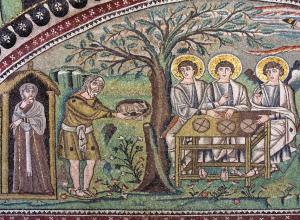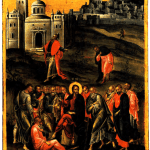
Christianity traditionally teaches that creation is filled with a variety of entities, some which are material, some which are purely spiritual. Creation is vast, and, even with our collective knowledge, we only know a very small portion of it. There is far more to it than we know or understand. There is far more than we will ever know in our lifetime. We can, at times, get glimpses of things beyond our normal experience, and from them, discuss what we have learned. Similarly, we can, through revelation, be given a sense of the diverse reality which lies before us, and again, we can reflect upon what we are told and extrapolate from it some sense of the created order and what is found in it. What we must recognize is that our discussions concerning such things are going to be highly speculative, and we are likely to get things wrong. The more we experience, the more we learn, the more we should be willing to revise our cosmological understanding. Theological treatises on angels fall into this category. We might know that they exist; some people might have some sort of experience which they believe connected them with the angelic realm, giving them and us insight to fuel our theological reflections, but we must remember, what we know, what we are told, what we experience, is so slight, that, for the most part, who and what angels are and their way of existence lies beyond our comprehension. We can talk about them being non-material beings who, somehow, have a way of interacting with material being. We can talk philosophically about them, reflecting, for example, on how non-material forces can influence material existence, and use that to help us explain their interaction with us (and the world at large). And yet, we must accept much of what we say remains highly speculative. What we say about angels ultimately is very naïve and simplistic.
Most of the time what is important is not our theological reflections, because, truth be told, they come from and reflect our limitations, but what we do with the knowledge we have. That is, what is important is our actions, the way we interact with the world around us, including our interactions with angels. We need to find a way to establish communion with them, even as we should find a way to commune with the rest of creation, so that together in our communion, we can become united and truly come to appreciate and respect each other in that unity. Creation is meant to be united as one, but that oneness must be understood as a oneness of communion, where everything and everyone still has their own interdependent existence.
Scripture tells us that we might not know when we are engaging or interacting with angels, which is why it is important that in all things we do, we act as if we were: “Do not neglect to show hospitality to strangers, for thereby some have entertained angels unawares” (Heb. 13:2 RSV). The author of the book of Hebrews is providing is a call-back to Abraham, and how his hospitality opened himself up, not only to angels, but to God. By engaging others with a sense of love and respect, showing hospitality to them, we are opening ourselves up to the angelic world, as Fr. George Maloney explained:
This is the world of angels we need to enter. With Abraham we are not looking for superhuman, angelic messengers, but we are, childlike, always expecting God to speak His Word in every social encounter with other human beings. Didn’t Jesus tell us He would be present in the times we encounter the sick, the hungry, the thirsty, the dying, the imprisoned and, whatsoever we would do to them, we would do to Him (Mt 25)?[1]
When we embrace hospitality, and open ourselves up to others through it, we begin to open ourselves up to communion with them, and through such communion, we also find ourselves communing with all that exists in relation to them, including, as it were, whatever angelic presences are with them. Our relationships with angels and the angelic world must not have us become disassociated with the world around us, and the people we meet, but rather, seen as coming from it.
The way we treat others is important; if we are open to helping those in need, be it the poor, the refugee, the woman whose life has been threatened by her boyfriend, the teen who has been kicked out of their family home and living on the streets, or the like,we are doing so for Christ. Since, around Christ, who is God, all the angels exist as spiritual beings, our interaction with Christ puts us in connection with those angelic presences. But it can also go the other way, as it did with Abraham. We can discern, through a realization of an encounter with angels, we are also being given an encounter with God – angels are, after all, God’s messengers. So that, when looking to the way Abraham encountered angels through his hospitality, it is possible to say he did so primarily through the way he treated the three strangers who visited him: and because he treated the strangers well, he was given the grace to discern the greater reality, that he was in contact with angels, and through them, God.
This should not be taken in the wrong way. Theological explorations on angels have produced a great wealth of material which we can use to discuss them. We have a sense that they are with God, but also, in their experience with God, they are also working on our behalf. Some angels seem to have more relationships with us than others, for example, those who are designated as “guardian angels.” But, such exploration should not make us forget what we have already been taught and learned, getting lost in a maze of derivative speculations instead of the activity Scripture and traditions say we should engage. If we want good relations with angels, we should have good relations with our fellow humans, while, if we do not act in such charity but rather, find ourselves drawn selfishly to our own inordinate desires and the injustices they create, we will more likely than not find ourselves further from angels and a proper understanding their way of being:
But you who love injustices, keep this admonition in mind, so that you may know that your avariciousness longing for wealth is idolatry, and that it separates you from the angelic orders, that is, from spiritual people, just as the idol of deceit is separated from the true God. [2]
Thus, though we ourselves are not angels, we can and should have a bond with them. We should engage them in the same way they engage us, which is, in the way of loving service. Their love for God has them serve God, and that service, among other things, has them share what they have been given with the rest of creation. Indeed, they love creation and work for its benefit. We should join in with that work, the work of love. We are to love God, and in that love for God, love and serve the rest of creation. The more we do so, the more we will find ourselves communing with creation and all that is in it, including angels. We will form bonds of love which will help establish an awareness of all that lies before us, all that we have connected to with that love, including angels.
[1] George A. Maloney, SJ, Communion of Saints (Hauppauge, NY: Living Flame Press, 1988), 81.
[2] St. Hildegard of Bingen, “Letter 220r” in The Letters of Hildegard of Bingen. Volume III. Trans. Joseph L Baird and Radd K Ehrman (Oxford: Oxford University Press, 2004), 14.
Stay in touch! Like A Little Bit of Nothing on Facebook.
If you liked what you read, please consider sharing it with your friends and family!
N.B.: While I read comments to moderate them, I rarely respond to them. If I don’t respond to your comment directly, don’t assume I am unthankful for it. I appreciate it. But I want readers to feel free to ask questions, and hopefully, dialogue with each other. I have shared what I wanted to say, though some responses will get a brief reply by me, or, if I find it interesting and something I can engage fully, as the foundation for another post. I have had many posts inspired or improved upon thanks to my readers.













